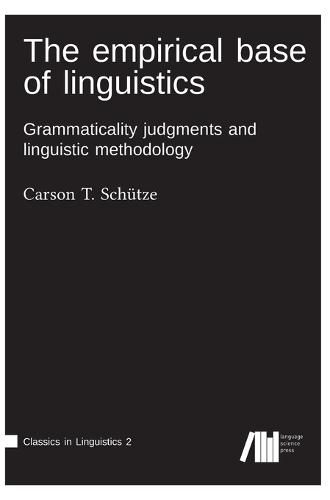Readings Newsletter
Become a Readings Member to make your shopping experience even easier.
Sign in or sign up for free!
You’re not far away from qualifying for FREE standard shipping within Australia
You’ve qualified for FREE standard shipping within Australia
The cart is loading…






Throughout much of the history of linguistics, grammaticality judgments - intuitions about the well-formedness of sentences - have constituted most of the empirical base against which theoretical hypothesis have been tested. Although such judgments often rest on subtle intuitions, there is no systematic methodology for eliciting them, and their apparent instability and unreliability have led many to conclude that they should be abandoned as a source of data. Carson T. Schutze presents here a detailed critical overview of the vast literature on the nature and utility of grammaticality judgments and other linguistic intuitions, and the ways they have been used in linguistic research. He shows how variation in the judgment process can arise from factors such as biological, cognitive, and social differences among subjects, the particular elicitation method used, and extraneous features of the materials being judged. He then assesses the status of judgments as reliable indicators of a speaker’s grammar. Integrating substantive and methodological findings, Schutze proposes a model in which grammaticality judgments result from interaction of linguistic competence with general cognitive processes. He argues that this model provides the underpinning for empirical arguments to show that once extragrammatical variance is factored out, universal grammar succumbs to a simpler, more elegant analysis than judgment data initially lead us to expect. Finally, Schutze offers numerous practical suggestions on how to collect better and more useful data. The result is a work of vital importance that will be required reading for linguists, cognitive psychologists, and philosophers of language alike. ‘Native speakers’ judgments of the acceptability of linguistic examples have always formed a major part of the data of linguistics, but linguists generally either have elicited such data in a haphazard fashion and accepted the results uncritically or have rejected acceptability judgments alt
$9.00 standard shipping within Australia
FREE standard shipping within Australia for orders over $100.00
Express & International shipping calculated at checkout
Stock availability can be subject to change without notice. We recommend calling the shop or contacting our online team to check availability of low stock items. Please see our Shopping Online page for more details.
Throughout much of the history of linguistics, grammaticality judgments - intuitions about the well-formedness of sentences - have constituted most of the empirical base against which theoretical hypothesis have been tested. Although such judgments often rest on subtle intuitions, there is no systematic methodology for eliciting them, and their apparent instability and unreliability have led many to conclude that they should be abandoned as a source of data. Carson T. Schutze presents here a detailed critical overview of the vast literature on the nature and utility of grammaticality judgments and other linguistic intuitions, and the ways they have been used in linguistic research. He shows how variation in the judgment process can arise from factors such as biological, cognitive, and social differences among subjects, the particular elicitation method used, and extraneous features of the materials being judged. He then assesses the status of judgments as reliable indicators of a speaker’s grammar. Integrating substantive and methodological findings, Schutze proposes a model in which grammaticality judgments result from interaction of linguistic competence with general cognitive processes. He argues that this model provides the underpinning for empirical arguments to show that once extragrammatical variance is factored out, universal grammar succumbs to a simpler, more elegant analysis than judgment data initially lead us to expect. Finally, Schutze offers numerous practical suggestions on how to collect better and more useful data. The result is a work of vital importance that will be required reading for linguists, cognitive psychologists, and philosophers of language alike. ‘Native speakers’ judgments of the acceptability of linguistic examples have always formed a major part of the data of linguistics, but linguists generally either have elicited such data in a haphazard fashion and accepted the results uncritically or have rejected acceptability judgments alt